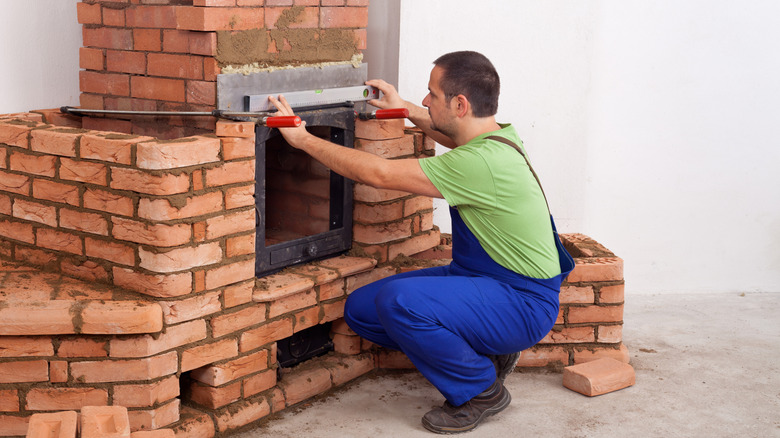Key Reasons Why A Masonry Heater Could Be Better For Your Home Than A Fireplace
Do you love the idea of heating your home with a real flame, but are wondering if there's a more efficient alternative to the fireplace? For all their charms, fireplaces are mind-blowingly inefficient. That's because much of the heat — about 75% of it, to be exact — escapes up the chimney with the smoke. This heat loss is one of the most important things to keep in mind before adding a fireplace to your home.
Fortunately, there are other options for heating your home that still afford the coziness of real flames flickering in the middle of the room, but keep as much heat as possible inside the house. We're talking about masonry heaters, which are also known as "Russian fireplaces" and "masonry stoves." Masonry heaters are comprised of a firebox, with a large masonry structure around it. The masonry structure has a number of baffles inside, and these channel the exhaust fumes out to the chimney. Thanks to their maze-like configuration, these baffles collect heat from the escaping exhaust gasses, and the surrounding masonry structure absorbs this heat. This giant thermal mass continues to give off heat for hours after the firewood has stopped burning inside the firebox.
It's this ability to collect, store, and slowly release heat from exhaust gasses that give masonry heaters a significant efficiency edge over their fireplace cousins. While fireplaces are only 25% efficient on average, masonry heaters' efficiency hovers around 95%. Below, we'll explore in depth the benefits and drawbacks of masonry heaters so you can decide whether getting one instead of a fireplace is worth it.
Benefits of replacing a fireplace with a masonry heater (and two drawbacks to keep in mind)
Masonry heaters boast extra benefits apart from helping you reduce home energy costs. For one, masonry heaters are quite adaptable, and the warmth they generate can be used for purposes other than home heating. These heaters usually come with built-in ovens. Whenever you're burning wood to heat the home, you can also bake a meal for dinner. Many masonry heaters also feature a heated bench — a warm, toasty place to sit or lay down on chilly nights when the extra warmth is most welcome. You even have the option of connecting a water coil to the masonry heater to raise the temperature of your domestic hot water.
Another important benefit of masonry heaters is that you don't need to add fuel continually. In most cases, you can burn a single load of fuel to get enough heat for 12 hours or more. The wood burns rapidly in a masonry oven, and thanks to the quick combustion, very little creosote or smoke is given off by the fire. In contrast, fireplaces generally produce a great deal of creosote, which ends up coating the inside of the chimney. Over time, these creosote deposits build up and turn into a substance that resembles tar, which necessitates expensive cleanups.
Despite their many benefits, masonry heaters come with two considerable drawbacks. For one, they're not cheap. On average, you'll pay about $30,000 to get one installed in your home. Another issue is that you'll need lots of space to accommodate both the masonry structure and a large enough fuel store for the firewood.
